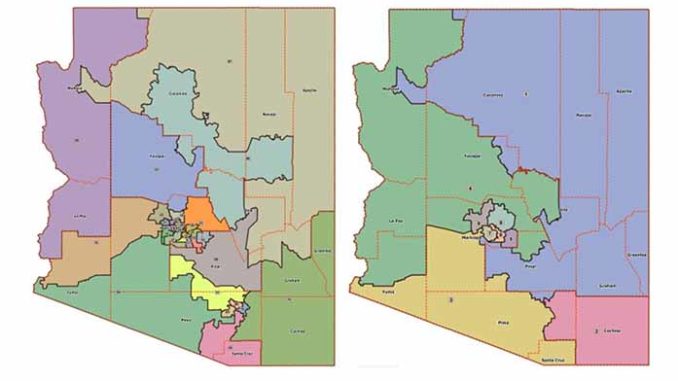
It’s one of the most important commissions in the state, but also one of the least known even though its work will impact Arizonans for years to come.
The five members of the Arizona Independent Redistricting Commission (IRC) will be tasked next year with redrawing the state’s congressional and legislative districts to reflect the results of the 2020 census. But while the “independent” in the commission’s name might suggest political party affiliation is unimportant, the opposite is true.
Per the Arizona Constitution, the five-member redistricting commission can include up to two registered Democrats and two registered Republicans, all of whom are appointed by the leadership of the state legislature. Then those four members select the fifth member, who must be someone not registered with one of the two major political parties.
And the selection of an Independent candidate is even more important because he or she will serve as the redistricting commission’s chairperson.
The five commissioners will start from scratch next year to establish district boundaries for the existing nine Congressional districts and 30 legislative districts. The work will be especially critical as Arizona could gain an additional seat in the U.S. House of Representatives if census results match up with preliminary population estimates.
“The concept of one-person, one-vote dictates that districts should be roughly equal in population,” the IRC website states. “Other factors to be considered are the federal Voting Rights Act, district shape, geographical features, respect for communities of interest and potential competitiveness.”
Nearly 140 people, including 38 avowed Independents and 1 Libertarian, applied for the redistricting commission. The applicants were whittled down earlier this month by the Commission on Appellate Court Appointments, resulting in 51 semifinalists, including 11 Independents and 20 candidates from each of the two major parties.
Partisan politics could tip the scale for or against any of the Independents if one party thinks the candidate is too closely aligned to the other party on ideology or past activities. Which is why every candidate had to document their political activities and contributions for the last 10 years.
One issue the appointment commission must consider when naming the redistricting commission finalists is where each candidate lives.
State law allows only two of the first four members to come from the same county, which could create issues because 14 Republican and 11 Democratic semifinalists are from Maricopa County. No such residency requirement applies to the Independent member who will chair the commission.
Government and business leaders in rural regions of the state often complain that important commission and state board positions are disproportionally given to residents of Maricopa and Pima counties. That has led for calls on the appointment commission to ensure applicants from outside urban areas are given serious consideration.
Among those being championed by rural supporters is Mignonne Hollis of Cochise County, whose application shows she has supported candidates on both sides of the aisle.
Hollis serves as executive director of the non-profit Arizona Regional Economic Development Foundation based in Sierra Vista. The organization is involved in promoting and supporting the aerospace, healthcare, and mining industries throughout Arizona, as well as defense / military and international trade opportunities.
According to Hollis’ application, she grew up in southeast Arizona and is a minority. Getting her name through to the finalist round would help the redistricting commission address criticisms of its lack of diversity over the years.
“It takes a skillset to successfully serve as chairman of a commission such as this, that must withstand political pressure and public scrutiny,” Hollis noted in her application. “I am a registered Independent who has a long history of working equally well with Republicans and Democrats in Arizona and believe I would have the support and respect of both as I perform the critical role of commission chair.’
At the same time, if the appointment commission openly gives priority to candidates from rural counties or to women then it could be accused of overlooking equally qualified and compelling candidates, such as the seven male Independent semifinalists.
The appointment commission chaired by Arizona Supreme Court Chief Justice Robert Brutinel will further vet the 51 applicants next month. Then a finalist list of 10 Democrats, 10 Republicans, and 5 Independents must be issued by early January 2021.
No one applied for the redistricting commission from the southern counties of Graham, Greenlee, Santa Cruz and Yuma, or from La Paz and Navajo counties.
